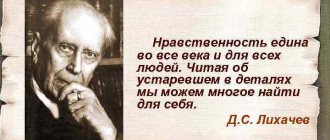Aphorisms and quotes by Denis Fonvizin
Fonvizin Denis Ivanovich, (1744/1745—1792), writer, playwright
Is he happy who is happy alone? Imagine a man who would direct all his nobility to the sole purpose of making him feel good, who would already achieve such that he himself would have nothing left to desire. After all, then his whole soul would be occupied with one feeling, one fear: sooner or later he would be overthrown. Is he happy who has nothing to desire, but only something to fear?
Without noble deeds, a noble fortune is nothing.
Living without a mind is bad; What will you do without him?
Take care of your wife, don’t give her free rein.
In the great world there are small souls.
In the eyes of thinking people, an honest man without great rank is a noble person.
Bribes cannot be prohibited. How can you solve a case for nothing, just for your salary?
Is it possible for books to lie?
It doesn't matter whether you have a husband or be tied up.
Everything is in the imagination. Follow nature, you will never be poor. Follow people's opinions and you will never be rich.
Everyone will find enough strength within themselves to be virtuous. You have to want it decisively, and then the easiest thing will be not to do something for which your conscience would prick you.
In human ignorance, it is very comforting to consider everything that you don’t know to be nonsense.
Two thousand souls and without the merits of a landowner are always two thousand souls, and without them the virtues are what the hell are the virtues.
For the whims of one person, the whole of Siberia is not enough!
The bad disposition of people who are not worthy of respect should not be distressing. Know that they never wish evil upon those whom they despise, but usually wish evil upon those who have the right to despise. People envy more than just wealth, more than just nobility: and virtue also has its envious people.
Women are usually chaste with deserved people, but rarely with rakes.
Have a heart, have a soul, and you will be a man at all times.
And I myself don’t know why this light was created!
How can one think that God, who knows everything, is not aware of our table of ranks?
How can the heart not be content when the conscience is calm!
How merciful fate is! She tries to unite people of the same mind, the same taste, the same character.
Sometimes it amazes you so much that the base creature prefers selfishness to everything
And to happiness he wanders along despicable paths, - So, apparently, you have never lived among people.
Selfishness makes the same miracles out of a person as love.
Self-interest rarely conquers love.
The lazy person is afraid of work, but the idle person does not tolerate the work itself.
A lazy person is more dependent on the disposition of the body, and an idle person is more dependent on the disposition of the soul.
We have a lot of printed nonsense not because there are more heretics, but perhaps because there are more fools.
A young man is like wax.
It is necessary that your husband obey reason, and you obey your husband, and you will both be completely prosperous.
The ranks begin - sincerity ceases.
Science in a depraved person is a fierce weapon to do evil. Enlightenment elevates one virtuous soul.
An ignoramus without a soul is a beast. The smallest deed leads him into every crime.
Don't lie everything you know.
Do not have love for your husband that resembles friendship. Have a friendship for him that would be like love. It will be much stronger.
It is impossible not to love the rules of virtue. They are ways to happiness.
The mind and science are subject to fashion as much as earrings and buttons.
He is not the rich man who counts out money in order to hide it in a chest, but the one who counts out what he has in excess in order to help someone who does not have what he needs.
One respect should be flattering to a person - spiritual, and only those who are in ranks not according to money, and in the nobility not according to ranks, are worthy of spiritual respect.
Oh Klim! your deeds are great!
But who praised you? Relatives and two stutterers.
Leaving wealth to children? If they are smart, they will manage without him; and wealth is no help to a stupid son. Cash is not cash worth. The golden dummy is everyone's dummy.
A truly inquisitive person is jealous of deeds, and not of rank; ranks are often begged for, but true respect must be earned; It is much more honest to be treated without guilt than to be rewarded without merit.
Good behavior gives direct value to the mind. Without it, an intelligent person is a monster.
The human heart is always a heart, both in Paris and in Russia: it cannot deceive.
Conscience, like a friend, always warns before punishing like a judge.
Thank God there are no duties on lies! After all, what ruin would there be for everyone!
I will calculate the degrees of nobility by the number of deeds that the great gentleman did for the fatherland, and not by the number of deeds that he took upon himself out of arrogance; not by the number of people hanging around in his hallway, but by the number of people satisfied with his behavior and deeds.
Happy is he who retains all his feelings in old age.
You must devote your life to your fatherland, if you want to be an honest person forever.
He who most often has the Lord on his tongue has the devil on his heart.
Honor is the soul of marital consent.
In my time, when I was younger, the people were much larger.
The courage of the heart is proven in the hour of battle, and the fearlessness of the soul in all trials, in all situations of life. And what is the difference between the fearlessness of a soldier who, in an attack, risks his life along with others, and between the fearlessness of a statesman who speaks the truth to the sovereign, daring to anger him. The judge who, fearing neither vengeance nor the threats of the strong, gave justice to the helpless, is a hero in my eyes.
More on the topic:
- Quotes from Russian writers
- Quotes by Konstantin Melikhan
- Quotes from Ilya Gerchikov
Popular:
- Success. Motivational Quotes
- good and evil
- Quotes from F.G. Ranevskaya
Comments:
SPADILO.RU
Role and place in literature
Denis Ivanovich Fonvizin was a writer of the Catherine era, publicist, playwright, translator, and creator of the national everyday comedy.
He occupied a special place in literature as the author of literary satire, striking in the depth of his comprehension of morals. Fonvizin's invaluable contribution to Russian literature and art was the intensification of the idea of classicism. The comedy “The Minor” created by him is closely connected with a special movement in literature and art (painting and architecture), which originated in some European states in the age of the rise of absolutism (the complete power of monarchs, personifying the unity, sovereignty and integrity of states) at the beginning of the 17th century and which acquired the name of classicism.
Fonvizin's works influenced the entire literary world of that time. Fonvizin, like Radishchev, sought to realistically depict the life of ordinary people. Condemnation of the serfdom regime, the noble nobility’s reverence for the culture of Western society, and bribery find a place in his writings. After him, Krylov expressed the same thoughts.
House of Fonvizins
Some techniques of satire, as well as the images that Fonvizin used, find a place in some of Pushkin’s works. Fonvizin in his works showed how serfdom had a corrupting influence on landowners and peasants. Having existed until 1861, serfdom corrupted the personality of a person even more than it was in the time of Fonvizin.
Fonvizin, with his literary works, showed a new stage in the growth of national art. Fonvizin’s literary works, donated by him for future generations, are included in the treasury of Russian literature.
Origin and early years
The future writer was born on April 14, 1745 in Moscow, into a family of nobles who came from an old German family of Livonian knights. His ancestors moved from Livonia during the reign of Tsar Ivan the Terrible. His great-grandfather's surname at that time was written separately in the German manner with the prefix von (Baron Peter Von Vizin). The continuous spelling was established later.
Denis Ivanovich Fonvizin had three brothers and four sisters. The writer's father, Ivan Andreevich Fonvizin, studied maritime affairs during the reign of Peter I. He served in the Navy for nine years, then transferred to the Army, and then was in the civilian service.
Education
Fonvizin, until he was 10 years old, was raised at home. The father of the future great writer was not a very educated man, but despite this, he taught all his eight children himself. After home schooling, Denis and his brother Pavel were sent to study at a gymnasium for noble children, which was opened at the University of Moscow.
Denis Fonvizin
Little Fonvizin's studies were good, and he had an excellent record at the gymnasium; he was given awards many times, even twice giving speeches in Russian and German at public events.
As the best student at the gymnasium in 1758, Fonvizin went to St. Petersburg, where he was introduced to the patron of the university of that time, I. I. Shuvalov, and Empress Elizabeth.
The luxurious palace, as well as the theatrical performance he saw, makes a huge impression on the boy.
In 1759, Fonvizin became a student at the Faculty of Philosophy at Moscow University, and three years later, when he was seventeen years old, he graduated from the university.
Creation
Fonvizin wrote his first literary works while still a university student. He began working on translations of several fables and other works by German authors in 1761. Fonvizin constantly visited Kozlovsky’s literary circle. In 1764, he performed his dramatic work Corion, written in a comedic style. In 1786, a social comedy was first published, which Fonvizin called “The Brigadier.” In 1883, the second comedy “The Minor” was published, which became the writer’s most famous work.
Major works
In 1782, in the most famous work of the writer, the comedy “The Minor,” Fonvizin’s talent as a playwright was revealed in all its fullness and brilliance. This play, like “The Brigadier,” gives a concrete image of Russian reality.
Fonvizin reads "The Brigadier"
Tombstone of Fonvizin
“The Minor” is known to everyone not only as a “comedy of manners”, but also as the first socio-political comedy. The playwright masterfully managed to turn a private corner of a noble estate into a public platform and show in it the “fruits of evil.” This work raised questions that worried Russian free-thinking people who lived in the “age of Enlightenment”: the responsibility of the sovereign for the people, the mandatory limitation of the autocracy of landowners, the education of worthy citizens of their country. Ignorance and bad temper were the main vices that were ridiculed in comedy. One of them is the topic of education, with education in the first place. This play, which Fonvizin wrote more than two hundred years ago, has not lost its relevance in the present day. It sounds a warning to today's youth against repeating Mitrofanushka's mistakes. The comedy “The Minor” by the gifted Fonvizin will always be for popular reading and will always hold an honorable place in the history of Russian literature.
Last years
Fonvizin was engaged in literary activity until the last days of his life, despite the fact that he was seriously ill (paralysis), but in the person of Empress Catherine II, he met with sharp disapproval. He was forbidden to publish a five-volume collection of essays, the magazine "Friend of Honest People, or Starodum", and did not receive permission to translate Tacitus. At the end of his life, the great writer worked on his autobiographical work “Frank Confession”, but did not have time to finish it.
On December 1, 1792, Denis Fonvizin passed away.
Chronological table (by date)
| Year(s) | Event |
| 1745 | Year of birth of Denis Fonvizin |
| 1777-1778 | Life and work in France |
| 1779 | Back home |
| 1781 | Service as a state councilor |
| 1782 | The premiere of the work “Minor” was successfully held |
| 1783 | The play "The Minor" was staged in Moscow |
| 1792 | Denis Fonvizin passed away |
Interesting Facts
- When Fonvizin was in St. Petersburg in 1760, he went to see a performance of Holberg’s play “Henry and Pernille” for the first time. What happens on stage makes a great impression on the writer, and his admiration for the theater remains for the rest of his life.
- The success of the comedy “The Minor” during the first production on stage was so great that wallets with money were thrown from the audience hall, according to the tradition of that time.
- Fonvizin's compatriots called him a dandy because he paid special attention to his appearance.
- The wife of Denis Ivanovich Fonvizin was the daughter of a wealthy merchant Katerina Ivanovna Rogovikova.
Memory of the writer
15 streets and 1 lane are named after the great playwright in Russia (according to 2013 data). There are streets of Fonvizin in Ukraine. In 2016, the Fonvizinskaya metro station was opened in the Russian capital.








